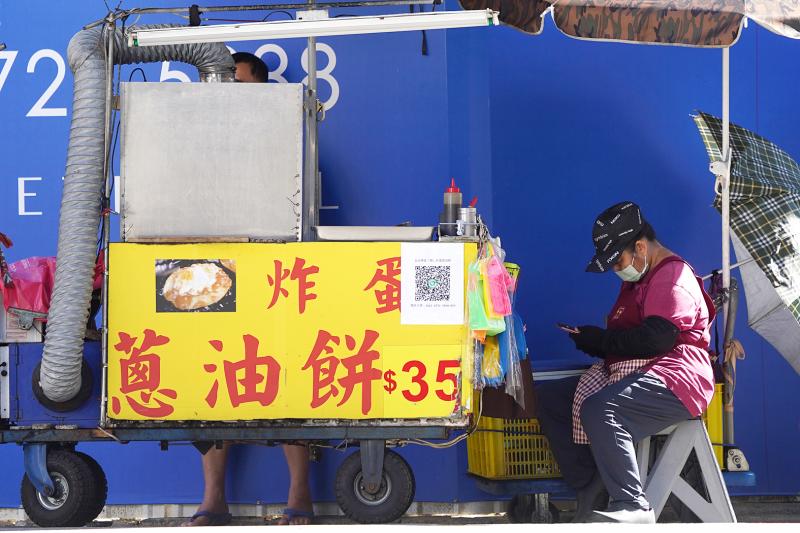The Ministry of Economic Affairs (MOEA) yesterday said it would give out 4 million vouchers worth NT$500 each that could be used only in restaurants, as well as at night markets, food vendors and gift shops, aiming to help small businesses that were affected by the COVID-19 pandemic.
The vouchers would only be available to Taiwanese who use the digital version of the Quintuple Stimulus Vouchers,” the ministry said.
The Triple Stimulus Vouchers issued in July last year were claimed by the overwhelming majority of Taiwan’s residents.

Photo: CNA
However, most opted for the paper version, with only 1.78 million people choosing the digital option.
The government is seeking to raise that number, Department of Commerce head Su Wen-ling (蘇文玲) said.
“We want more people to use the digital vouchers for multiple reasons: It reduces administrative costs, lowers the risk of spreading COVID-19 and increases the share of people using digital payments, which is a goal of the government,” Su said.
The ministry’s vouchers would be given out on a first-come-first-served basis to 4 million people who sign up for the digital Quintuple Stimulus Voucher program.
Half of the voucher budget comes from the ministry’s stimulus funds, while the other half was donated by Formosa Plastics Group (台塑集團).
The vouchers can only be used in restaurants and at individual vendors, including bakeries and dessert stores, but not at supermarkets or convenience stores, Su said.
“More than 99 percent of restaurants and other food vendors are small and medium-sized businesses, or even micro vendors,” Su said. “They have been disproportionately hit by the COVID-19 outbreak this year, and we are trying to direct more help toward them.”
The ministry has been working with hawkers and food stalls at night markets so that they can receive digital payments from services such as Line Pay or Jkopay Co Ltd (街口支付).
“We will announce other incentives on a rolling basis to encourage the public to use digital vouchers,” Su said.
“Since last year’s Triple Stimulus Vouchers, we have worked to make it even easier to do so,” Su added.

Sweeping policy changes under US Secretary of Health and Human Services Robert F. Kennedy Jr are having a chilling effect on vaccine makers as anti-vaccine rhetoric has turned into concrete changes in inoculation schedules and recommendations, investors and executives said. The administration of US President Donald Trump has in the past year upended vaccine recommendations, with the country last month ending its longstanding guidance that all children receive inoculations against flu, hepatitis A and other diseases. The unprecedented changes have led to diminished vaccine usage, hurt the investment case for some biotechs, and created a drag that would likely dent revenues and

Macronix International Co (旺宏), the world’s biggest NOR flash memory supplier, yesterday said it would spend NT$22 billion (US$699.1 million) on capacity expansion this year to increase its production of mid-to-low-density memory chips as the world’s major memorychip suppliers are phasing out the market. The company said its planned capital expenditures are about 11 times higher than the NT$1.8 billion it spent on new facilities and equipment last year. A majority of this year’s outlay would be allocated to step up capacity of multi-level cell (MLC) NAND flash memory chips, which are used in embedded multimedia cards (eMMC), a managed

CULPRITS: Factors that affected the slip included falling global crude oil prices, wait-and-see consumer attitudes due to US tariffs and a different Lunar New Year holiday schedule Taiwan’s retail sales ended a nine-year growth streak last year, slipping 0.2 percent from a year earlier as uncertainty over US tariff policies affected demand for durable goods, data released on Friday by the Ministry of Economic Affairs showed. Last year’s retail sales totaled NT$4.84 trillion (US$153.27 billion), down about NT$9.5 billion, or 0.2 percent, from 2024. Despite the decline, the figure was still the second-highest annual sales total on record. Ministry statistics department deputy head Chen Yu-fang (陳玉芳) said sales of cars, motorcycles and related products, which accounted for 17.4 percent of total retail rales last year, fell NT$68.1 billion, or

In the wake of strong global demand for AI applications, Taiwan’s export-oriented economy accelerated with the composite index of economic indicators flashing the first “red” light in December for one year, indicating the economy is in booming mode, the National Development Council (NDC) said yesterday. Moreover, the index of leading indicators, which gauges the potential state of the economy over the next six months, also moved higher in December amid growing optimism over the outlook, the NDC said. In December, the index of economic indicators rose one point from a month earlier to 38, at the lower end of the “red” light.